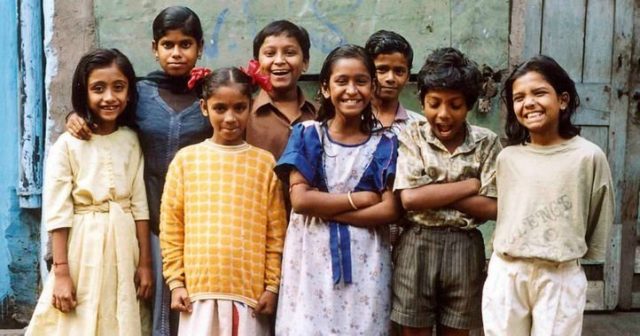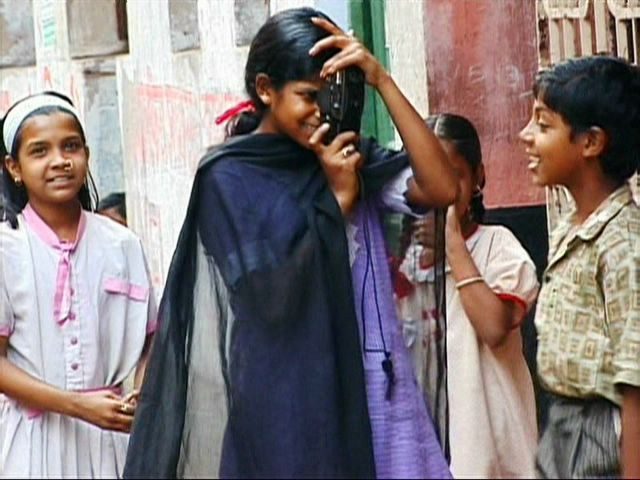To the north of Kolkata, near the intersection of Chittaranjan Avenue and Shobhabazaar with Beadon Street, lies the red light district of Kolkata.
An abode to around 13,000 sex workers, this area is Asia’s largest hub for sex workers. The illegal circuit of trafficking, drug peddling, and local criminal gangs unfolds with the fading light of dusk.
But the heart-wrenching stories contained in the grimy lanes that shelter around 12,000 children are wrapped up in a labyrinth. The labyrinth that grips the little ones with the relentless cycle of poverty and prostitution. The cycle that is difficult to break!

There is still hope in the world of darkness
The power of a documentary lies in the unstained fact of educating and honestly showing the world as it exists. Zana Briski, an American photographer, went on a mission to film prostitution in Kolkata. This mission almost seemed impossible as it meant shooting lives behind closed doors and curtains.
Instead of shamelessly selling the drama, Briski along with her collaborator, Kauffman, decided to dig deep. They saw the fascination in the eyes of the kids who were excited to meet the Western visitors as they entered Sonagachi.
Instilling hope in the world of despair and darkness, Zinski chanced upon the idea of changing the lives of eight young children by handing them a camera. She chose to tell a story through their eyes, nurturing their talent and filling them with innocence and wonder.
Although hope is a good thing, it’s small.
Small in the context of the great challenge that these children face.
Also read: Prostitution In The Name Of The Lord- Devadasi System In Indian Temples

Lost Childhood and Degrading Ambience
Kochi, one of the kids born into brothels, has to say ”For Geeta Masi upstairs, I do dishes, I bring tea, do errands. She gives us money. I mop twice a day. The porch too. In the evening if they want, I do shopping too. Until 11:00 at night, if they want curry or rice, I have to get it. I keep thinking if I could go someplace else and get an education, I wonder what I could become.“
“My father tried to sell me. If my sister didn’t come to get me, my father would have sold me.”
As Briski inspires another kid, giving her subtle tricks how to hold a camera and capture the perfect image, Tapsi candidly lays out her experience, “Just today I took someone’s picture and he badmouthed me. I didn’t mind… I have to do something with my sewing and photography. I need to make a living and take care of my sister and me.”
While Kochi, who has been modestly shy, tells how she lives her life devoid of childhood, ”My father tried to sell me. If my sister didn’t come to get me, my father would have sold me. I worry that I might become like them.”
Puja, a ten-year-old, will be drawn into prostitution when she hits puberty. Puja’s grandmother and mother engaged in prostitution and she is destined to follow if no one breaks the chain.
Suchitra, on the other hand, lives with her aunt. Her mother is no more. But her aunt wants to send her to Bombay to work in the line. All the girls in Suchitra’s family are in the line. Hence, she never gets out of the house.
When asked whether there is any solution to this, she complacently denies. Suchitra faces a lot of pressure from her family to make money. She has lost faith in anyone challenging the system.
Abhijit who seems to have an innate flair for art and photography lost his only mother. He was spiraling into depression unless he was awarded the golden opportunity. He was uplifted when he was selected as a child jury for an exhibition of photography by children.
Today, Abhijit is set to make his Hollywood debut as an assistant director. He completed film studies from NYU. Kochi had her education sponsored and she went on to study in the States. The prospect of education inspired Puja but she was drawn back from school. She went on to become a sex worker, carrying off her trade in Sonagachi.
Seeking Optimism within Reality
One side of our country presents a booming economy with middle- class privileges. The other side is invisible. This cruel and parallel world exists without any exit. The world saw the exploitation and humiliation of these children and their craving for freedom through the Oscar-winning documentary, Born into Brothels, written and directed by Zana Briski and Ross Kauffman.
But life still remains the same ugly way for the children of Sonagachi as it was before the global recognition brought in by the documentary. The realism that these girls will end up in prostitution like their mothers one day is devastating.
The sense of optimism instilled by the noble efforts of Zana Briski by allowing the children to perceive their surroundings as a raw material and regard themselves as artists are worth a million in the efforts of many.
(Images from Google Images)
More on ED Times:
http://edtimes.in/2017/09/why-we-should-do-more-to-help-the-children-born-to-prostitutes/
http://edtimes.in/2017/08/flipped-our-bloggers-fight-it-out-over-people-judging-prostitutes-prostitution/





























